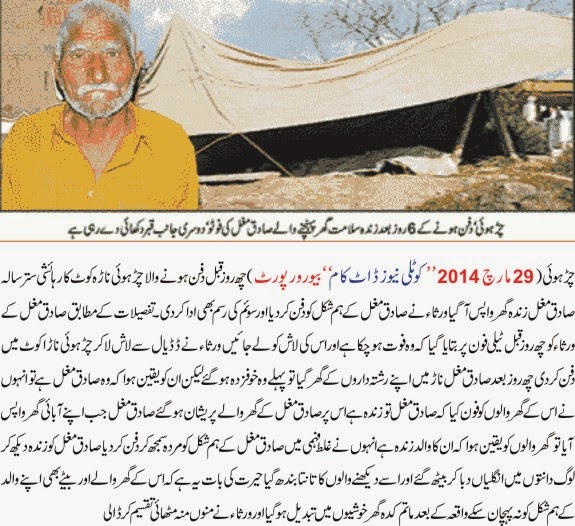ISLAMABAD: The special court
constituted to try former military ruler Pervez Musharraf for high
treason indicted him on the charge on Monday, DawnNews reported.
Musharraf has pleaded not guilty to the charge.
The indictment took place during today's hearing after the arrival of the former military ruler in the premises of the special court from the Armed Forces Institute of Cardiology (AFIC).
The three judge court headed by Justice Faisal Arab of the Sindh High Court read out the indictment today against the ex-army strongman.
Prior to the indictment, Farogh Naseem, who was representing Musharraf, requested the court to allow his client to travel to Dubai to see his ailing mother. He said the Constitution did not allow anyone to restrict the movements of a citizen.
Naseem said Musharraf had arrived in court voluntarily, adding that the warrant against his client had not been implemented.
Naseem moreover said that his client himself was unwell and that Musharraf’s proper treatment was only possible in the United States.
For nearly three months, Musharraf has been in the AIFC where he was taken after developing a cardiac condition.
Musharraf had to rush to the AFIC on Jan 2 after he suffered chest pain while he was on his way to the special court. Initially, he was kept in the ICU but was later shifted to a room.
Late on Saturday, Musharraf was again moved to the AFIC’s ICU after his condition deteriorated due to stress upon receiving the news of his mother's illness who is currently hospitalised in Sharjah and is suffering from respiratory complications.
Earlier, non-bailable arrest warrant for Musharraf were issued in case he failed to appear before the court today.
For his appearance in the special court today, three different routes were established by the capital police before Musharraf’s departure from AFIC.
A police squad and commandos had reached AFIC early in the morning to escort Musharraf to the court's premises.
For the former president’s security, three thousand police and Rangers personnel were deployed on the routes.
The police squad is being headed by Superintendent Police Islamabad Mustanser Feroz and strict security measures were also in place outside AFIC.
Meanwhile, Musharraf’s lawyer Ahmad Raza Kasuri told media representatives that the judges of the court were not on one page and due to that their judgment could not be deemed as trustworthy.
Kasuri further said defence lawyers would not appear in court and the case had taken on a political nature.
Musharraf has pleaded not guilty to the charge.
The indictment took place during today's hearing after the arrival of the former military ruler in the premises of the special court from the Armed Forces Institute of Cardiology (AFIC).
The three judge court headed by Justice Faisal Arab of the Sindh High Court read out the indictment today against the ex-army strongman.
Prior to the indictment, Farogh Naseem, who was representing Musharraf, requested the court to allow his client to travel to Dubai to see his ailing mother. He said the Constitution did not allow anyone to restrict the movements of a citizen.
Naseem said Musharraf had arrived in court voluntarily, adding that the warrant against his client had not been implemented.
Naseem moreover said that his client himself was unwell and that Musharraf’s proper treatment was only possible in the United States.
For nearly three months, Musharraf has been in the AIFC where he was taken after developing a cardiac condition.
Musharraf had to rush to the AFIC on Jan 2 after he suffered chest pain while he was on his way to the special court. Initially, he was kept in the ICU but was later shifted to a room.
Late on Saturday, Musharraf was again moved to the AFIC’s ICU after his condition deteriorated due to stress upon receiving the news of his mother's illness who is currently hospitalised in Sharjah and is suffering from respiratory complications.
Earlier, non-bailable arrest warrant for Musharraf were issued in case he failed to appear before the court today.
For his appearance in the special court today, three different routes were established by the capital police before Musharraf’s departure from AFIC.
A police squad and commandos had reached AFIC early in the morning to escort Musharraf to the court's premises.
For the former president’s security, three thousand police and Rangers personnel were deployed on the routes.
The police squad is being headed by Superintendent Police Islamabad Mustanser Feroz and strict security measures were also in place outside AFIC.
Meanwhile, Musharraf’s lawyer Ahmad Raza Kasuri told media representatives that the judges of the court were not on one page and due to that their judgment could not be deemed as trustworthy.
Kasuri further said defence lawyers would not appear in court and the case had taken on a political nature.


